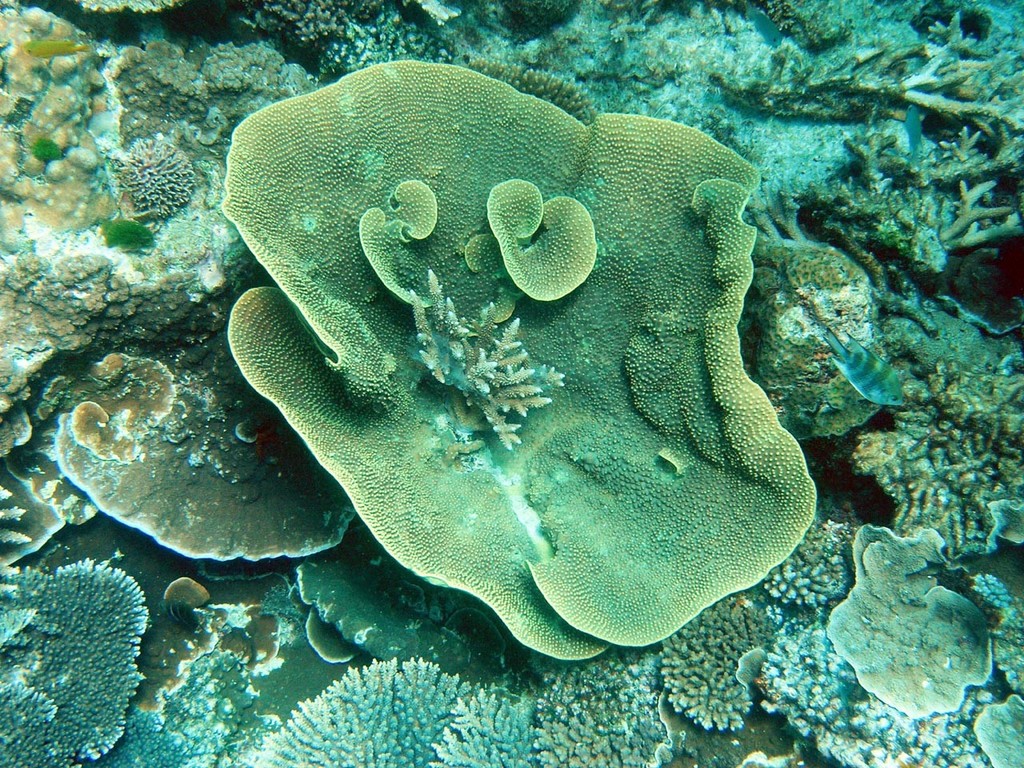Climate Change will damage reefs at different rates
by ARC Centre of Excellence Coral Reef Studies on 23 Jul 2011

Diverse reef community, Heron Island, southern Great Barrier Reef, Australia. Photo courtesy of K-le Gomez.
ARC Centre of Excellence Coral Reef Studies
http://www.coralcoe.org.au/
Climate change and acidifying ocean water are likely to have a highly variable impact on the world’s coral reefs, in space, time and diversity, international coral scientists have cautioned.
The picture that is emerging from studies of past coral extinctions and present impacts on today’s reef systems is complex and subtle and will demand much more sophisticated management to preserve reefs intact, the team of scientists said in a paper in the international journal Science.
'New research confirms that coral reefs…. are indeed threatened by climate change, but that some current projections of global-scale collapse of reefs within the next few decades probably overestimate the rapidity and uniformity of the decline,' the researchers say.
'A considered view of all the most recent evidence suggests that some coral reef systems will decline more rapidly – especially those subject to other human pressures such as overfishing – while others may change in composition, but manage to persist for longer,' says lead author Professor John Pandolfi of the ARC Centre of Excellence for Coral Reef Studies and The University of Queensland.
The paper, 'Projecting coral reef futures under global warming and ocean acidification' by John M. Pandolfi, Sean R. Connolly, Dustin J. Marshall and Anne L. Cohen appears in the latest issue of the journal Science.
'Coral reefs occupy a small part of the world’s oceans, yet harbor a hugely disproportionate amount of its biodiversity,' the researchers say 'More than 450 million people from 109 countries live close to coral reefs, which provide important sources of ecosystem goods and services for these communities.
'But reefs have suffered degradation from human over-exploitation and pollution over centuries to millennia, degradation that has accelerated in the last 50 years. Global warming and ocean acidification are now compounding these threats.'
However reefs are naturally highly diverse and resilient, and are likely to respond to the changed conditions in different ways and at varying rates.
Past extinction crises in coral reef ecosystems appear to coincide with episodes of rapid global warming and ocean acidification, they say. This has led some to predict rapid, dramatic, global-scale losses of coral reefs.
'Widespread degradation of reefs is already underway. However, rates of future decline will be highly variable, because coral reefs are naturally highly diverse with some species able to cope with change more than others. Moreover, changes in ocean and climate conditions will be different in different regions, and the partnership between corals and their symbiotic algae has variable capacity to adapt to changing conditions,' says Prof. Sean Connolly of the ARC Centre of Excellence for Coral Reef Studies and James Cook University, another of the study’s authors.
Evolution and genetic change in both creatures may make them more tolerant of major changes in ocean temperature and chemistry – but, paradoxically, it may also accelerate the decline of reef species. However, human management is necessary to improve the corals’ chances. Actions that improve coral diversity will tend to make reefs more resilient. The researchers also note that large populations of reef species, not already stressed by overfishing or coastal runoff, are likely to be better able to adapt to the challenges of climate change.
'This makes the overall picture extraordinarily complex. We do not yet have a model that explains the full spectrum of reef responses everywhere,' Prof. Pandolfi says.
The researchers highlighted some critical knowledge gaps, including effects of climate change on interactions between species, and the potential rates of adaptation of reef species to warmer and more acidic conditions. 'Our ability to continue to improve our projections of climate change effects on coral reefs depends especially on advances in our understanding of these areas,' Prof. Connolly says.
'We think it would be best if the world prepares itself for a range of possible impacts and responses on reefs, and manages them accordingly, if we are to give our corals their best possible chance of survival through what we know from geological history is bound to be a very stressful era of environmental change.'
The team concludes: 'The best and most achievable thing we can do for coral reefs currently to deal with climate change is to seek to manage them well.
'However, slowing rates of climate change, and reducing the strong selection imposed by human impacts such as fishing and coastal development will remain critical to the long-term persistence of coral reef ecosystems.'
ARC Centre pf Excellence Coral Reef Studies website
If you want to link to this article then please use this URL: www.sail-world.com/86285